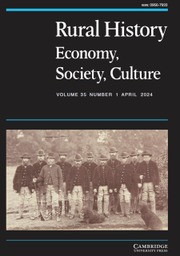Article contents
The Political Power of Farmers: An English Perspective
Published online by Cambridge University Press: 31 October 2008
Extract
England has one of the longest histories of industrialisation and urbanisation of any West European country. This has inevitably had a formative influence in the structuring of its social science research. For political scientists it has involved an almost overwhelming concern with urban political systems and industrial cleavages. An analysis of class based voting has been a major focal point with its implicit assumption that any other cleavages based, for example, on religious or regional identities are marginal or atavistic. Certainly there has been little acknowledgement of any significant urban–rural divide. In consequence the study of rural politics has been something of an intellectual backwater and there has been no attempt to define or identify rural politics as an object of study. The blinkered vision of political scientists is disappointing. It unduly ignores a number of studies that have engaged with mainstream debates and frequently made worthwhile contributions, most notably, with reference to the case of agriculture, in the understanding of relations between government and industry (Cox et al, 1986; Grant, 1983). There are also signs that some political scientists are beginning to reject models of national (i.e. urban) voting behaviour and political systems in favour of more spatially sensitive work in which greater prominence is given to regional and local differences (Dunleavy, 1990; Johnston, 1985, 1987; Johnston et al, 1988).
- Type
- Research Article
- Information
- Copyright
- Copyright © Cambridge University Press 1996
References
- 2
- Cited by


